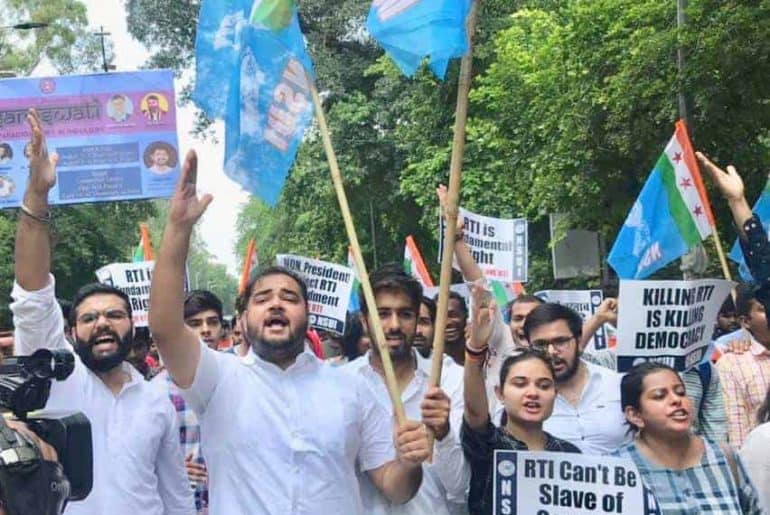The National Student’s Union of India (NSUI) held a protest march against the amendments made to the Right to Information Act (RTI) by the Government. Read on to know more.
On 1st August 2019, the NSUI held a protest march in front of the Faculty of Arts, North Campus, showing its strong displeasure towards the move taken by the Government to make amends to the RTI Act. The members of the students’ political party marched from the Faculty of Arts to Kirori Mal College, all the while chanting slogans like “RTI Bachao, Desh Bacho“.
Neeraj Kundan, National President, NSUI said, “Today the RTI is one of the most important laws in the country, it directly affects the people. In 2017, when the BJP Government saw that the RTI could expose high government officials like Smriti Irani, and even Prime Minister Narendra Modi, they started trying to curb its power. The Government is now trying to reduce its autonomy and cage it. NSUI is going to hold protests all over the country until our rights are given back to us.”
Students and associations like The North East Students’ Society, Delhi University (NESSDU) turned up in large numbers to support the NSUI’s protest against the RTI amendments. They marched with bold banners and enthusiastic slogans. The presence of the Delhi Armed Police and Central Reserve Police Force (CRPF) showed how protests in the DU are feared to turn violent, but this was an extremely peaceful protest.
Surbhi Dwivedi, National General Secretary of NSUI and the RTI Team Convener emphasised on the importance of the RTI for the student community. She said, “The RTI is the most effective tool in student politics. It helps students to find discrepancies in the University. A strong RTI is our right.” Robin Chaudhary, National Secretary of NSUI, said that they were determined to fight for democracy and that if the Government did not heed to their demands, they would go on a hunger strike.
The RTI Act, 2015 is an Act of the Parliament of India “to provide for setting out the practical regime of right to information for citizens”. It has made the workings of the Government more transparent, helped to reduce corruption and has facilitated in the workings of this democracy. The RTI Commissioners used have fixed five-year tenure and their salaries were equal to certain posts in the Election Commission and the bureaucracy. The recent amendments made to the act by the BJP Government have changed this. According to the new amendments, the central government now has direct control over the Chief Information Commissioner and Information Commissioners’ term of office and salaries. The changes made to the RTI are being seen by many as the Government trying to control it, and as a result of this many voices in objection to the RTI amendments are being raised all over the country.
Feature Image Credits: NSUI
Juhi Bhargava




